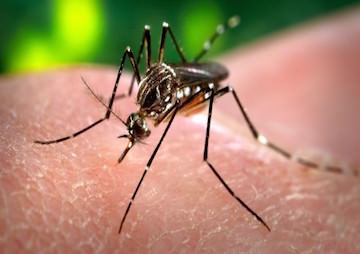Warming Linked to Spread of Zika Virus
Scientists believe that record average temperatures may be helping to create an environment that has led to big increases in the number of disease-carrying mosquitoes. The Aedes egypti mosquito has now spread to 80 percent of Brazil. (James Gathany via Wikimedia Commons)
The Aedes egypti mosquito has now spread to 80 percent of Brazil. (James Gathany via Wikimedia Commons)
By Jan Rocha / Climate News NetworkThis Creative Commons-licensed piece first appeared at Climate News Network.
SAO PAULO — The Zika virus, transmitted by the same mosquito as dengue fever, has spread with alarming speed throughout South and Central America — and scientists in Brazil suspect that global warming is exacerbating the problem.
Although the virus, named after the Ugandan forest where it was first identified, usually causes only mild symptoms and often passes undetected, it has been associated with a surge in the number of cases of babies born with microcephaly, which can cause brain damage.
The World Health Organisation (WHO) has now declared the situation an international public health emergency.
The numbers are alarming. Until last year, while dengue fever claimed many victims, Zika was unknown in Latin America. Since first detected in April 2014, there have been over 4,000 births of babies with suspected microcephaly in Brazil, compared with a previous yearly average of 154.
Twenty-four countries in South and Central America have reported cases of microcephaly, and the rapid spread of the virus is being attributed by some scientists to global warming.
Abnormal warming
Last year was the hottest on record, with temperatures for the first time about 1°C above pre-industrial levels. But in some parts of Brazil, average temperatures rose by between 3° and 5°C, according to data from the Centre for Weather Forecasting and Climate Studies at Brazil’s National Institute for Space Research. The abnormal warming of the Pacific caused by El Niño contributed to this.
Studies by Brazilian scientists show that the Aedes egypti mosquito has spread to 80% of the country, an area of 6.9 million sq km (2.6 million square miles) — four times larger than a decade ago.
Paolo Zanotto, a virologist at the University of São Paulo’s Biomedical Sciences Institute, is co-ordinating a network of laboratories studying the Zika virus.
“We have noticed that dengue has spread to areas that were previously too cold for it, like the south of the country.”
He says: “The number of mosquitoes is increasing, their area of activity is increasing, and contact with populations who have never before had contact with dengue is increasing. Global warming is probably collaborating with its spread to previously free areas.”
Other scientists agree. Christovam Barcellos, a geographer at the Fiocruz Institute in Rio de Janeiro, says: “We have noticed that dengue has spread to areas that were previously too cold for it, like the south of the country.”
In colder regions the mosquito has a shorter life, but it can still spread dengue and Zika.
However, Oliver Brady, an Oxford University epidemiologist and co-author of a research paper recently published by The Lancet on the potential export of dengue from Brazil by travellers, is more cautious, warning that the connection between global warming and the spread of Zika is still speculative.
“What is clear is that 2015 and 2016 present an increased risk, because of the high temperatures and rainfall that have been observed, but we don’t know yet if this will be confirmed as a long-term tendency,” he told the newspaper O Estado de São Paulo.
Brazilian specialists believe that the spread of dengue and Zika has also been facilitated by successive governments’ failure to provide basic sanitation and clean water to the poorer part of the population. Only 58% are connected to the sewage system, and 15% lack running water.
Breeding places
Added to these factors, the drought of 2015, which affected both the semi-arid zone of the Northeast and the urban conglomerations of the Southeast, caused severe water shortages and led to a big increase in the informal storage of water.
This provided many more potential breeding places for the mosquito, and dengue fever cases reached 1.5 million, with 863 deaths.
The government has declared war on the insect, drafting in 220,000 soldiers to reinforce health agents in a campaign to visit every residence in Brazil and clear away anything where mosquito larvae breed — including old tyres, empty bottles, badly-closed water tanks, plant containers, and even the leaves of Bromeliad plants.
Free mosquito repellent is being distributed to women on welfare programmes. The WHO decision to declare a public health emergency will make it easier to get funding for the urgent work of developing a vaccine.
Another possible solution is the “good mosquito”, a transgenic mosquito developed by the UK firm Oxitec. When it breeds with normal mosquitoes, it leaves them sterile.
It is now being trialled in Brazil, Panama and the Cayman Islands. In the town of Piracicaba, São Paulo state, it was reported that the release of thousands of “good mosquitoes” led to the death of 82% of the Aedes population.
Jan Rocha is a freelance journalist living in Brazil and is a former correspondent there for the BBC World Service and The Guardian.
Your support matters…Independent journalism is under threat and overshadowed by heavily funded mainstream media.
You can help level the playing field. Become a member.
Your tax-deductible contribution keeps us digging beneath the headlines to give you thought-provoking, investigative reporting and analysis that unearths what's really happening- without compromise.
Give today to support our courageous, independent journalists.






You need to be a supporter to comment.
There are currently no responses to this article.
Be the first to respond.